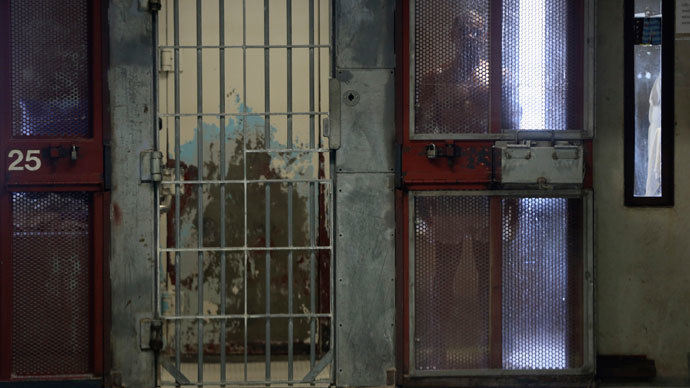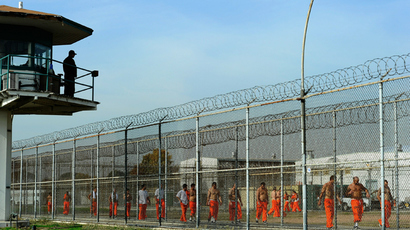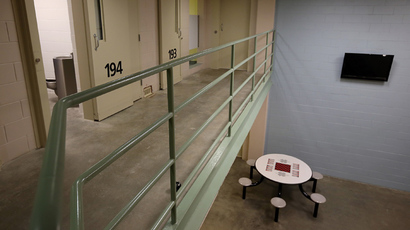Graphic court video shows prison guards deploying pepper spray on mentally ill inmate

A US federal court has released new video footage showing California prison guards repeatedly spraying mentally ill inmates with pepper spray in an apparent attempt to convince the prisoners to take their medication.
California policy requires officers in the Department of Corrections to film all cell extractions. The footage in question was played in court in October as part of an inmate’s lawsuit seeking to halt the use of pepper spray against the growing mentally ill prison population.
Perhaps the most disturbing of the six tapes shows a naked, screaming inmate at Corcoran State Prison, who is sprayed at least five times within 15 minutes. An officer can be heard saying “spray him again” more than once, with roughly six officers then overwhelming the prisoner and strapping him down to a gurney.
“When we order involuntary medications, the inmate is told they will receive medications whether they like it or not,” prison psychiatrist Dr. Ernest Wagner told the Los Angeles Times.
Wagner testified that that the 31-year-old inmate was refusing to eat food, instead opting to consume his own feces. He was also hearing voices and “would have died” had he not been forced to take the drugs.
The same man was moved to a prison psychiatric hospital and eventually returned to the general population. He was paroled in February.
Lawyers representing the roughly 30,000 mentally ill prisoners against excessive force said the very notion of pepper spraying inmates is evidence that the Department of Corrections does not follow a policy meant to help mentally ill inmates - many of whom will be re-released into the public at some point.
“The mentally ill are being punished for their mental illness,” San Francisco attorney Jeffrey Bornstein told the judge.
Prison authorities maintain that cell extractions - which involve a number of guards dressed in protective vests, body pads, and helmets with full shields - are only conducted as a last resort. Inmates are removed from their cells if they refuse to take medication, cover the windows to their cell, or flood their cell with toilet water, among other reasons.
The corrections department issued a statement saying the process is only done to keep inmates “from harming themselves or others and to ensure that they are placed in a more appropriate mental health setting.” This sometimes consists of simply moving that prisoner to another call.
“What you don’t see on these videos is the hours of discussions that take place between the inmate and clinical staff before a cell extraction is ordered and the video camera starts rolling,” the statement continued.
While the reliance on cell extractions is controversial, the documented footage was the subject of debate as well. The California Department of Corrections spent months fighting to keep that documentation blocked from court.
“As good a job as the attorneys and the witnesses may do in bringing out the facts for the court, that is a poor substitute for actually seeing what they are talking about,” Michael Bien, lead counsel for the inmates, told the Sacramento Bee. “In fact, citizens have a duty to look at these images, as terrible as they are.
“This is happening in taxpayer-funded institutions, the inmates are residents of this state and the officers are public employees,” he continued. “People in California should see for themselves the excessive for used on seriously mentally ill patients and be able to measure the impact it has on their sense of humanity.”














